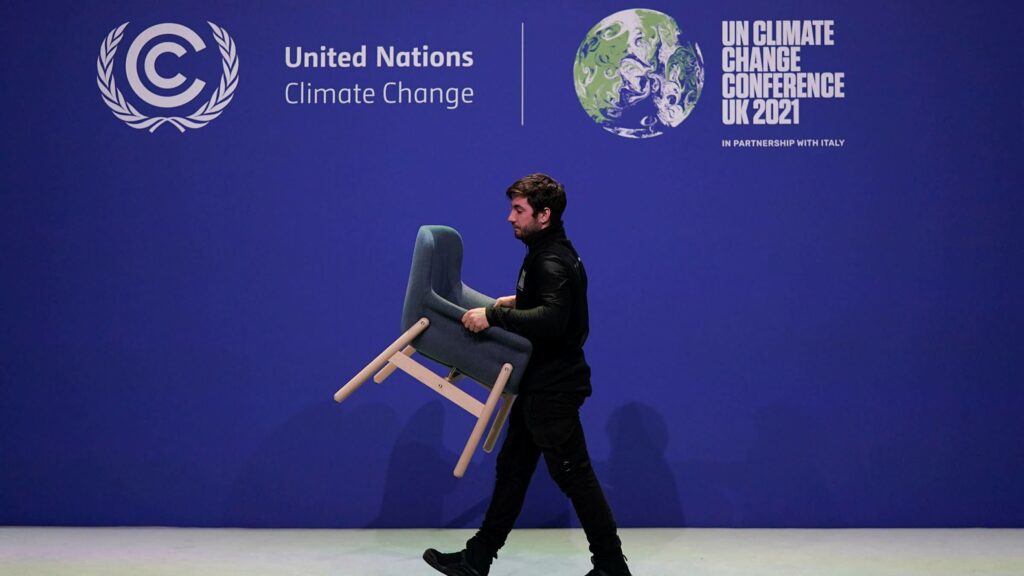Climate talks focus on damages

Negotiators were locked in overtime talks on the thorniest issue of who should pay for the damage to countries from climate change, while the end of coal and fossil fuels remained in the sights of the UN COP26 summit.
The issue of climate compensation moved firmly to the centre of the talks overnight on Friday, as the scheduled deadline for the summit passed and discussions stretched into the weekend.
Rich countries stopped short of making a commitment to provide “loss and damage” funding for vulnerable countries dealing with climate change, a key demand from developing countries in particular, in the latest set of draft texts issued Saturday morning.
Instead wealthy countries, such as the US, offered a “dialogue” and to fund the skeleton operation of the so-called Santiago network, a UN group that will publish information about affected countries can access funding.
Access to funding was a cause for plaintive speeches at the UN session on Friday, where nations as diverse as Kenya, Gabon, Tuvalu and the Marshall Island made an emotional case.
The latest text from COP26 upheld the reference to curbing coal unless it involves carbon capture technology, as well as reducing “inefficient” fossil fuel subsidies. However it added a further clause about needing to help workers in the fossil fuel industry make a “just” transition into other jobs.
The inclusion of fossil fuels in the text for the first time is regarded as major milestone if passed.
Another key area being discussed is how countries will measure and report their emissions to the UN so that it gets an accurate assessment of their climate plans. A group including Saudi Arabia are understood to be resisting transparency through a detailed emissions reporting programme.
Disaster relief for climate-related events was also proposed by a group of developing countries through a financing facility but was blocked by countries including the US, EU and Australia, and is not in the draft text.
Progress on loss and damage was the “key” to unlock the negotiations, said Jennifer Morgan, head of Greenpeace International. “If we don’t have more money on loss and damage, and on finance, the we won’t get the ambition accelerated.”
Gabon, as the chair for the Africa group, said negotiators were “not even at the point where we’re talking about the money for loss and damage”.
We’re talking about how we get to the point where we have money,” said Lee White, Gabon’s minister of water and forests, the sea, the environment.
The refusal by rich countries to create a new loss and damage facility was “a clear betrayal” of the world’s vulnerable nations, said Tasneem Essop, executive director of Climate Action Network, a global network of more than 1,500 civil society organisations in more than 130 countries.
The differences are expected to be aired on Saturday afternoon when country representatives will make statements during a lengthy plenary session. If enough progress is made, a final closing plenary may be held on Saturday night.
What is in the latest COP26 draft text
Coal and fossil fuels: First time inclusion of the subject at this COP. Draft makes a “request” that countries “accelerate efforts towards” phasing out “unabated coal power” — referring to power plants that do not use technology to capture their CO2 emissions. Also to end “inefficient” fossil fuel subsidies, although without specifying a time period for when this will happen. New addition is a clause that “recognises” the need for support for workers in those sectors to find other jobs.
Loss and damage: Proposal to start a “dialogue” about funding a UN body to provide vulnerable nations with “technical assistance” to help avoid and address climate change consequences. But a standalone fund to help pay for loss and damage, proposed by developing countries, has been rejected, so far, by rich nations including US, Europe and Australia.
Climate finance: Notes with “deep regret” that rich countries missed their target of providing $100bn a year to help developing countries, and commits them to raise at least that amount, annually, through to 2025.
Adaptation: Asks rich nations to double their support for adaptation measures, which will help developing countries prepare for climate change, by 2025, compared to 2019 levels. If approved, this would imply that adaptation funding could be around $40bn annually, from $20bn in 2019.
Carbon markets: Aims to create market for units representing emissions reductions that countries can trade, under so-called Article 6. Disputes remain over the counting system, as well as over the use of legacy credits issued to countries under an old system set up under the Kyoto protocol.
Mitigation: By the end of 2022, countries requested to improve their 2030 national climate targets. Pledges now put the world on course for between 2.5C and 2.7C of warming by the end of the century, far from the Paris climate accord goals, which aim to limit global warming to well below 2C, ideally 1.5C, since pre-industrial times.
Climate Capital

Where climate change meets business, markets and politics. Explore the FT’s coverage here.
Are you curious about the FT’s environmental sustainability commitments? Find out more about our science-based targets here
